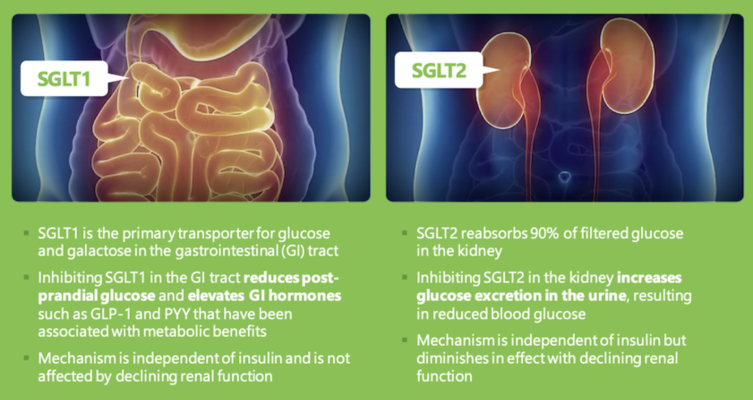
November 9, 2022 — Lexicon Pharmaceuticals, Inc. announced that a new analysis of results from the SOLOIST-WHF Phase 3 outcomes study of its investigational heart failure treatment sotagliflozin, was presented at the American Heart Association Scientific Sessions 2022 in Chicago, Illinois. The oral presentation, titled “The effect of the dual SGLT1 and 2 inhibitor sotagliflozin on cardiovascular mortality and hospital readmission rates for heart failure at 30- and 90-days post discharge in patients with type 2 diabetes hospitalized for worsening heart failure in the SOLOIST-WHF trial,” was delivered at 3:30pm CT this afternoon during the ‘Advances in Diabetes and Heart Failure: From Bench to Bedside’ session.
Treatment with sotagliflozin demonstrated significant relative risk reductions of 46% to 52% for readmission for non-fatal heart failure events and for the composite of cardiovascular death and readmission for heart failure at 30- or 90-days following hospital discharge versus placebo.
Heart failure is the number one cause of hospitalizations for Americans ages sixty-five years and older, with approximately one million hospitalizations for heart failure annually in the United States. On average, twenty-five percent of patients will suffer another heart failure event and need to be readmitted to the hospital within 30 days of their initial discharge, and that number jumps to 65% of patients who will be readmitted within one year. Heart failure cost burden is projected to reach nearly seventy billion dollars in the United States by the year 2030, with 80% of those total costs related to hospitalizations.
“These results with sotagliflozin are meaningful for the patient, the caregiver, and the healthcare system overall,” said Bertram Pitt, M.D., FACC, professor of medicine emeritus at the University of Michigan, School of Medicine, and presenter of the results from the new analysis. “Hospital readmissions are burdensome, time-consuming, and costly. This analysis provides evidence that sotagliflozin has the potential to address all of these concerns if administered to patients prior to or at hospital discharge after experiencing an episode of worsening heart failure.”
“The SOLOIST-WHF trial continues to yield robust findings that further help characterize and differentiate the efficacy and safety profile of sotagliflozin in patients with acute or worsening heart failure,” said Dr. Craig Granowitz, Lexicon’s senior vice president and chief medical officer. “Importantly, based on this new analysis by Dr. Bertram Pitt, sotagliflozin may reduce the likelihood of readmission rates for heart failure events and thus reduce the significant burden on patients, caregivers and the healthcare system.”
About the SOLOIST-WHF Study
SOLOIST-WHF was a multi-center, randomized, double-blinded, placebo-controlled Phase 3 study evaluating the cardiovascular efficacy of sotagliflozin versus placebo when added to standard of care in 1,222 patients with type 2 diabetes who had recently been hospitalized for worsening heart failure. The primary endpoint was the total number of events comprised of deaths from cardiovascular causes, hospitalizations for heart failure, and urgent visits for heart failure in patients treated with sotagliflozin compared with placebo.
SOLOIST-WHF achieved its primary endpoint, with overall tolerability similar to placebo. Results were presented at the Late-Breaking Science Session of the American Heart Association (AHA) Scientific Sessions 2020 and simultaneously published in The New England Journal of Medicine (NEJM) in an article titled: “Sotagliflozin in Patients with Diabetes and Recent Worsening Heart Failure” which may be accessed at www.nejm.org
For more information: www.lexpharma.com


 November 14, 2025
November 14, 2025 









